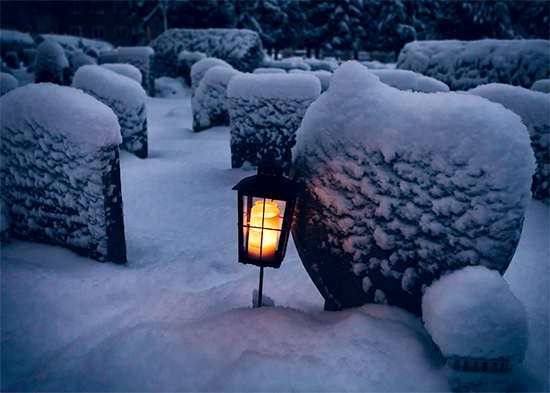
August-
September 2023
Changing World...
Unchanging Mission
------------------
|





A Sequel Stands Beyond
By Bill and Brenda Evans
Gray tombstones rose through the eight-inch snow like stone chimneys. Male relatives carried my father’s casket, then lowered it into a seven-foot gash in the clay at the head of my grandparents’ graves. My bones shivered.
In the grays and whites of sky and earth, I heard words. Prayers, really, and songs about grace and hope. Then, damp red clay the color of dried blood was first sprinkled then shoveled into the gash, filling the earth’s wound where my father’s body lay. I thought of the word everlastingness and wondered whether it was even a word.
I recalled my father two months earlier, covered in white, lying in a hospital bed in his and Mother’s bedroom. A fetal position, body curled forward, head bowed, limbs drawn up close. In pain and frailty, Daddy slowly withdrew from this life. To change the sheets, I maneuvered him into a sitting position with feet brushing the floor, grasped him under his arms, and pivoted him into a safe chair. I died a little with my proud, diminished father in my arms. He was thin and insubstantial. He didn’t speak—or couldn’t. He was preparing.
Daddy found his image in Mother’s dresser mirror opposite the chair. He flinched as if to say, “Who is that man?” I cursed the mirror for showing him and myself for seating him there. Quickly, I finished the sheets and clutched him close. Covered his face, his eyes, his body, hiding him from himself in the mirror—holding, caressing. Daddy was never a hugger, but he gave no resistance. I maneuvered him back into his fetal position, smoothed his hair, his gown, his fresh white sheets.
I remembered more. Daddy—the man who sat with my sister and me at the piano when I was ten. We sang songs of the church. Grace offered her beautiful alto. I played and sang soprano. Daddy brought in tenor, motioned rhythm, and tapped his toes. He could have square danced as he did when he was young if he had been so minded.
My father was a man quick to laugh. He wielded hammers to build houses, a man who talked half the night with a drunk friend to keep him from driving. He tended livestock, waded into baptismal rivers as a deacon, testified for an accused but innocent neighbor charged with murder, triumphed over sister Grace and me in Chinese Checkers, spoke good and not evil of others. He carried me in his arms against his scratchy serge suit long after I was old enough to walk and later pulled me along with him wherever he went—except when he slit hogs’ throats or attended birthing cows.
The man who loved me even though he never once said the words.
At the cemetery, I mumbled aloud, “If in this life only we have hope in Christ, we are of all men most miserable. Daddy is in everlastingness.”
I said it because I knew Daddy’s soul was not lost, annihilated, or dead, but alive somewhere with the Lord. I said it because I grieved, but not as others who had no hope. I said it because I had no earthly remedy for Daddy’s death. Something was ruined, broken, flung irreversibly like glassy splinters shimmering all around me that I could not collect and put together again. Daddy was gone from me but everlastingly with the Lord.
I felt the weight of that cold, red dirt on my soul. Men and women arranged frozen flowers over the covered gash to disguise it. Standing there in the snow before the soil and the flowers, I wept. For myself, for Mother and Grace, for our mates and our children, and for my father who I enjoyed for so many years but lost. My good father.
Then another statement flickered through my mind like refracted light. A poet’s words: “This world is not conclusion; a sequel stands beyond.” Daddy believed it, believed Jesus, believed the sequel that stands beyond and is gained by a crucifixion and resurrection. The sequel that meant a future, a hereafter, a later-on, a life after death, a world to come with the Lord.
In that moment, I understood that sequel as never before. The sequel Daddy believed in, banked on—would have placed all bets on, had he been a betting man. I finally understood the blessed consolation and the home beyond the river he often sang about. In my mind, I saw his right hand motion a rhythm once again on our piano bench, as he did at Rock Springs Church every Sunday where he led the singing. I heard his clear tenor voice:
I’ve a home beyond the river,
I’ve a mansion bright and fair.
I’ve a home beyond the river,
And I’ll dwell with Jesus there.
Often, I mourn again as I did in the icy cemetery that February day 43 years ago, when frozen flowers were laid with love over the bare red soil of his grave. I mourn for myself and my family, but not for Daddy, because I believe that sequel as well. Daddy dwells with Jesus there.
This week, I thought of another song Daddy often sang. One line is: “I’ll have a new body. Praise the Lord! I’ll have a new life.” So, I did a brief study on the biblical perspective of the resurrection.
It gave me fresh hope for the sequel Daddy is living, and that I anticipate after my own death.
As far as I can tell, Old Testament saints had no finely-developed doctrine of the resurrection. Yet many spoke, though often with a slant, of their belief in it. According to Hebrews 11:17-19, Abraham believed God would raise Isaac, whom he was ready to sacrifice (Genesis 22). Job shared a short parable about a tree’s dead stump that “through the scent of water” would bud and put out branches again. Then he asked, “If a man die, shall he live again?” (Job 14:7-14) Job’s thought seems equivocal there. Maybe like a tree’s “dead stump,” a man will sprout new life after death, or maybe he will not. Commentators are divided on whether Job was describing a resurrection or just a dead stump. But later, in 19:23-27, Job seemed quite certain his Redeemer lived, and he would see Him one day. I believe it, too.
We must not overlook Ezekiel 37 and the valley of dry bones that, of course, refer to “resurrection” or restoration of Israel but seem also to look toward our own resurrection as well. David and Hosea spoke indirectly of resurrection, and Elijah and Elisha both served as God’s instruments for raising the dead. Daniel was explicit: “And many of them that sleep in the dust of the earth shall awake, some to everlasting life, and some to shame and everlasting contempt” (Daniel 12:2). Daniel believed this life is not the conclusion; a sequel stands beyond.
When I study Acts, I am always struck by the emphasis on the resurrection. Both Peter and Paul preached repeatedly about Jesus’ resurrection—and very often about ours as well. Peter and John annoyed the priests, the captain of the temple, and especially the Sadducees, because they “taught the people, and preached through Jesus the resurrection from the dead” (Acts 4:1-2). In Acts, Paul “confessed” there will be a resurrection of both the just and the unjust (Acts 24:14-15), as John did many years later in Revelation 20.
Paul described our resurrection transformation with incomparable force and beauty in 1 Corinthians 15. We will be changed, he said, becoming imperishable, immortal, and glorious when God gives us a body He has chosen (1 Corinthians 15:38). Surmounting them all, Jesus said, “He that believeth in me, though he were dead, yet shall he live” (John 11:25).
Like Daddy, I know a sequel stands beyond!
About the Writer: Brenda Evans lives and writes in Ashland,
Kentucky. You may contact her at beejayevans@windstream.net. |
|

